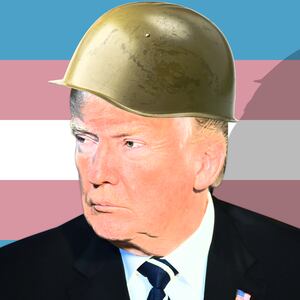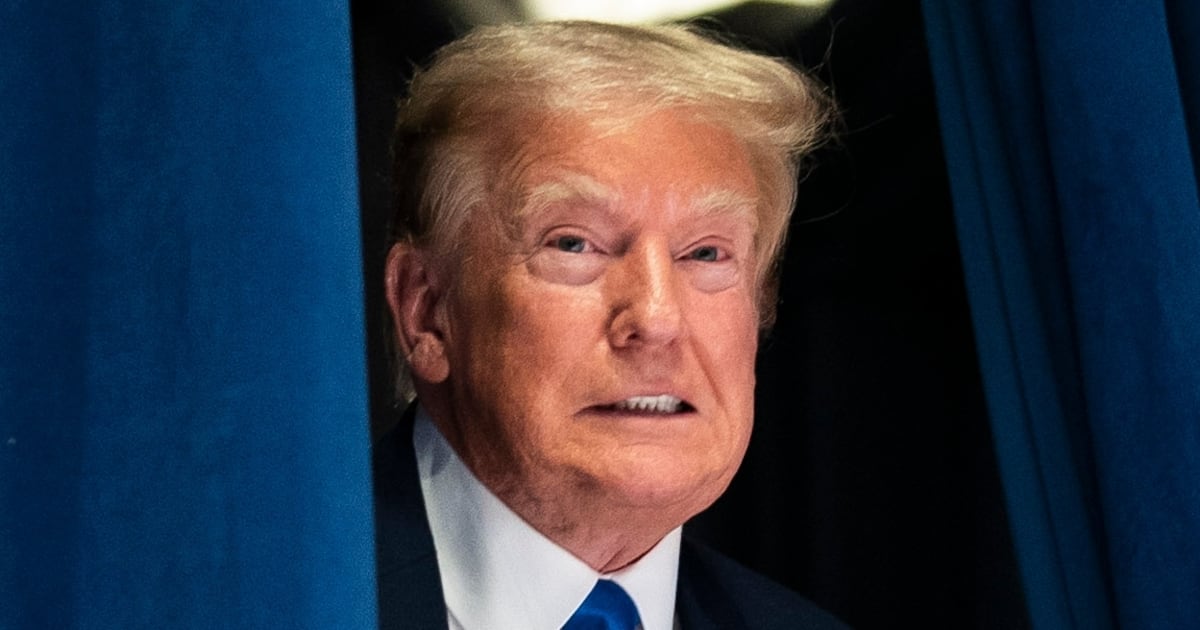Kristy Golba spent 31 years in the United States Marine Corps. She did multiple combat tours. She went to Somalia, Djibouti, Iraq, and Bahrain. She feels, frankly, that she has given much of herself to this country.
“I sacrificed a lot,” she told The Daily Beast. “Myself, my family, friends.”
But after leaving the Marines in 2013 and coming out as a transgender woman, Golba has faced a discouraging roadblock: A long-standing Department of Veterans Affairs policy that excludes gender transition surgeries from its health care offerings.
“I put my life on the line for this country multiple times,” said Golba. “I think that the least [the VA] can do for me is provide the medical coverage that I’m seeking.”
Major medical associations have long affirmed the necessity of transition-related health care, including surgeries. But although the VA provides mental health counseling and hormone therapy to transgender veterans, it draws the line at surgeries—a regulation that has been critiqued by the American Medical Association, among others.
That policy, formally implemented in 1999, has a widespread impact. Although the fate of current transgender service members remains up in the air due to President Trump’s troop ban, many transgender people—like Golba—came out after their time in the armed forces.
Some 18 percent of respondents to the 2015 U.S. Transgender Survey said that they had served in the military. That means a disproportionate number of transgender people—over 130,000 by some estimates—are veterans, including, for example, Monica Helms, the creator of the community’s pride flag.
According to a 2017 VA.gov news post, an estimated 5,000 transgender veterans rely on the VA for health care. Golba is one of them. Now living in South Florida, she goes to the VA in Miami to visit her endocrinologist and her mental health specialist. The doctors there, she says, “like me and they take care of me.”
“But as soon as you mention the word ‘surgery’ or talk about it, they don’t want anything to do with it,” she told The Daily Beast.
The most the VA does—according to the VA.gov news post—is provide “evaluations” for transgender surgeries and assist in the event of post-surgical complications. But when it comes to the procedures themselves, the answer is no.
In May 2016, LGBT advocacy group Lambda Legal and the Transgender American Veterans Association, or TAVA, petitioned the VA to remove the surgical exclusion from its health care offerings, arguing that it is arbitrary to provide some of the treatments that can alleviate gender dysphoria—like hormone therapy—while excluding others.
They also pointed out in their petition that the VA covers “substantively identical procedures” to non-transgender veterans—like mastectomy, breast reconstruction, or penile implants—for various medical conditions while simultaneously denying them to veterans who suffer from gender dysphoria.
These arguments have proved to be successful with many insurance carriers and companies, the LGBT groups noted, and yet the VA policy remains in place: “The VA is quickly becoming an outlier among health care providers in its failure to provide full coverage of the treatment necessary for patients with gender dysphoria.”
That May 2016 petition led to a protracted legal tussle. Lambda Legal appealed the VA in June 2017, with several medical associations submitting a supporting amicus brief as well. The appeal was filed on behalf of TAVA and two specific veterans: Dee Fulcher and Giulliano Silva.
Silva, an army veteran, is a transgender man barred from receiving surgery—in his case, a mastectomy. Fulcher, like Golba, is a Marine Corps veteran and a transgender woman. She was a Marine for 11 years, leaving in 1992 and ultimately transitioning in 2013. She would like to undergo surgery, too, but cannot receive it through the VA health system.
“I feel like I am being made less of a person,” Fulcher said in a press release, “and it is devastating for me, both emotionally and for my physical health, that it is excruciating to be trapped in gender purgatory because the surgery I need is denied through the VA because I’m transgender.”
After oral arguments earlier this year, the VA began seeking public comment on the surgical exclusion in July 2018, indicating that they were considering a change to the regulation, and prompting the LGBT group to drop the appeal because, as Lambda Legal counsel Tara Borelli explained to The Daily Beast, “that provided the relief that we had sought, which is we wanted the agency to take action on this discriminatory rule.”
The comment period ended in September—and there have been no developments since.
“Now, we are awaiting any action from that,” TAVA president and retired Army major Evan Young told The Daily Beast, referring to the public comment period. “However, so far there has been nothing.”
Military Times reported in September that VA officials were “still evaluating” the issue, with a spokesman saying that the department was reviewing all the public comments it received.
Asked for an update for this story, VA spokesperson Susan Carter told The Daily Beast, “We received more than 6,000 comments during a period that closed on September 7. VA will consider these comments and determine the appropriate response. There is no specific time frame required for this type of consideration. VA is proud to provide care, benefits, and other services to all veterans, including transgender veterans.”
If the VA doesn’t remove the exclusion, the issue could head back to court.
“After hearing from doctors, lawmakers, veterans, and transgender veterans themselves, the only medically, legally, and morally sound path for VA is to remove this biased rule,” Harper Jean Tobin, the National Center for Transgender Equality’s director of policy told The Daily Beast. “It's a senseless intrusion between veterans and their doctors, and one that causes considerable harm to veterans. We'll have to see whether VA does right by veterans, or whether a court will have to force it to.”
Borelli told The Daily Beast that, for now, Lambda Legal is still waiting to find out how the VA responds to the comments, many of them submitted by physicians. If the VA “pays attention to the clear medical consensus,” she said, then “there is only one possible outcome.” If they don’t, legal action is possible—but not yet promised.
“We’re crossing each bridge as we come to it, and part of that is a question for our clients as well, so I’m definitely not in the position to telegraph what we might do,” said Borelli. “But we are eager to see what the [VA] does here and have invested an enormous amount of work in trying to get the agency to this point.”
That leaves transgender veterans like Golba in limbo, wondering how much longer they will have to wait for the full range of transition-related health benefits to be available.
“I’m not going to cry,” Golba told The Daily Beast, tearing up, when asked if she had hope that the surgical exclusion would one day be lifted, “but look at the current administration. Do you think you would have hope?”
Golba is referring, of course, to the White House’s various attacks on transgender people: the rollback of Obama-era restroom guidance, the leaked memo on the term “sex” from the Department of Health and Human Services, and the transgender troop ban, which remains under injunction pending future court rulings.
The fact that current VA head Robert Wilkie was a Trump pick makes it more difficult for her to be optimistic.
Adding insult to injury for transgender veterans is the fact that—because the troop ban remains under injunction—currently serving transgender troops have been able to successfully advocate for surgical care. In November 2017, NBC News reported, an active-duty service member received transition-related surgery for the first time.
“Right now, transgender VA employees and actively serving transgender service members can have gender-confirming surgeries,” Young told The Daily Beast. “It is a discredit to the honorable service of patriotic transgender veterans to deny us these medically necessary health benefits.”
For Golba, service to country came at deep personal cost—as it does for many veterans. Retiring from the Marines after three decades in the closet, determined to start life anew, she was afraid but eager to finally transition.
“I was really high up for the Marine Corps,” she told the Daily Beast. “And I was like, I have to get out. I can’t live my entire life without embracing who I am.”
Her family, Golba says, had a hard time accepting her as a woman, touting her military service as undeniable proof of masculinity.
“Nobody could believe or understand that I wanted to be a girl—and when I told them that, nobody believed it,” she said. “They were like, ‘How could you be in the Marines for 31 years and then just say that you want to be a girl?’”
Thanks to Trump’s troop ban, it is now widely known how little it would cost to provide full health benefits to transgender people. PolitiFact confirmed last July—following several media reports—that the military does indeed annually spend multiple times more on erectile dysfunction drugs than it would on transition-related care. In the ongoing challenges against the troop ban, Borelli and other LGBT advocates like to refer to the cost of transition-related health care for the government as “mere budget dust.”
“The costs of providing this care, as we know, are negligible,” said Borelli.
That only makes Golba more incredulous that the VA still hasn’t lifted the exclusion yet. If these benefits are inexpensive to provide, if they are affirmed by medical professionals, and if they would help people who served the country, she wonders, then what possible excuse is there for the surgical ban to remain in place?
“Don’t tell me you’re not doing it,” she would say to the VA. “I want to know why you’re not doing it. What’s it to you? How is it hurting you?”







